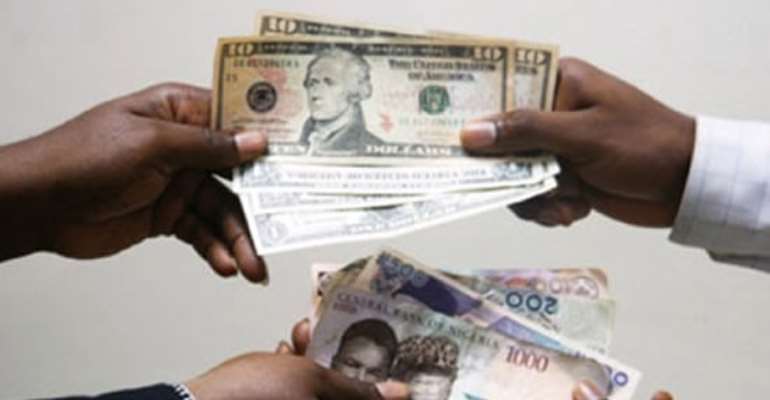Experts predict Naira recovery over dollar sales to BDCs

Economists on Sunday lauded the Central Bank of Nigeria (CBN) on its decision to allow the sale of foreign exchange to Bureau de Change (BDC) operators by agent banks to international money transfer operators, saying this would result in the naira firming up against other currencies.
This was also the position of the Association of Bureaux De Change Operators of Nigeria (ABCON).
The CBN, on Friday, had directed authorized currency dealers who are agents to international money transfer operators to sell foreign currency accruing from inward money remittances to licensed BDC operators.
In his reaction to the development, Professor Akin Iwayemi, former President of the Nigerian Economic Society, said, 'Allowing banks to sell dollars to BDCs will increase the supply of dollars in the market and this will bring down the pressure on the naira which will eventually result in the value of naira shoring up. It is a basic economic principle that when supply rises, price goes down.'
According to him, with the huge remittances from Nigerians in the Diaspora, foreign exchange supply would be buoyed and this would eventually improve naira's exchange rate vis-Ã -vis other currencies.
Speaking in a similar vein, Robert Olatunde, Head of Research at Afrinvest West Africa Limited said the policy shift would enable funds flow in from other sources to supply forex to the market, adding that the effect of this would be a stronger naira.
The Acting President ABCON, Aminu Gwadabe, in a telephone interview with the Nigerian Tribune, said 'it is very laudable for the CBN to consider a key sector of the economy like BDC into the market,' assuring that there will be some level of stability in the naira exchange rate.
With this development he said, the naira would be seen coming to acceptable and realistic exchange rate because due to non-admittance of the sector earlier, there was a lot of hoarding and speculation as people were buying dollar which they ordinarily did not need just to guard against the fast depreciating naira.
'We will begin to see huge activity in the market because the announcement will stem the volatility in the exchange rate. Also, the convergence between the interbank and parallel market rate will begin to manifest and liquidity will be injected,' Gwadabe said.
According to him, the policy will also address the rates issue, even as it addresses the plight of BDC operators that have been out of business as increased activity and employment generation will return to the sector.
The World Bank Migration and Remittances Factbook 2016 showed that Nigerians living abroad sent home $20.8 billion in 2015. The figure, it said, is by far the largest volume of remittances to any country in Africa and the sixth largest in the world.
'The United States is the biggest remittance sending country to Nigeria, followed by the United Kingdom. Nigerians will receive $5.7 billion in remittances sent from friends and family members in the US and $3.7 billion from the UK in 2015. Nigeria is also the third largest destination country for migrants from other African nations,' the Factbook said.
The CBN's directive to banks to sell forex to BDCs represents a major policy shift as the apex had resolved to stop the weekly sale of forex to BDC operators.
The CBN governor, Godwin Emefiele, while addressing a press conference in January to announce the discontinuation of sale of dollars to BDCs had said, 'Operators in this segment of the market would now need to source their foreign exchange from autonomous source. They must however note that the CBN would deploy more resources to monitoring these sources to ensure that no operator is in violation of our anti-money laundering laws.'
According to the CBN governor, the apex bank resorted to this measure because it had noted that, 'Whereas the CBN has continued to sell US Dollars at about N197 per dollar to these operators, they have in turn become greedy in their sales to ordinary Nigerians, with selling rates of as high as N250 per dollar.'
The CBN governor also said, 'BDC operators have abandoned the original objective of their establishment, which was to serve retail end users who need US$5,000 or less. Instead, they have become wholesale dealers in foreign exchange to the tune of millions of dollars per transaction. Thereafter, they use fake documentations like passport numbers, BVNs, boarding passes, and flight tickets to render weekly returns to the CBN.'
But the measure which was targeted at relieving the pressure on the currency and shore up its value vis-Ã -vis foreign currencies achieved little as the naira continued its unrestrained cascade against foreign currencies, exchanging at a point at the rate of N360 to the dollar.
This forced the CBN to adopt the liberalized forex market last month.
While announcing the new policy on June 15, Emefiele said the exchange rate would be purely market-driven using the Thomson-Reuters Order Matching System as well as the Conversational Dealing Book. He, however, added that the CBN would participate in the market through periodic interventions to either buy or sell FX as necessary.
But in spite of the policy shift, scarcity of dollars has not allowed naira any respite as demand for dollars always outstrips supply with the effect that naira continued to be worsted by other currencies at both the interbank and parallel markets. Hence, the decision by the CBN to rescind its decision on BDC operators sourcing their forex from other sources. - Tribune.
